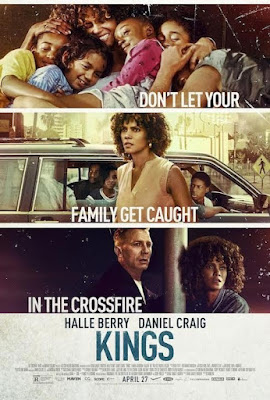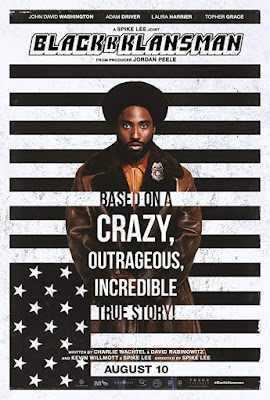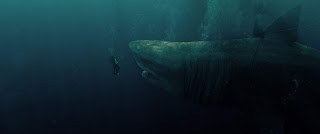GIALLO IN VENICEaka GIALLO A VENEZIA(Italy - 1979)
Directed by Mario Landi. Written by Aldo Serio. Cast: Leonora Fani, Jeff Blynn, Gianni Dei, Maria Angela Giordano, Michele Renzullo, Eolo Capritti, Vassili Karis, Giancarlo Del Duca, Maurizio Streccioni. (Unrated, 99 mins)
After the genre reached its pinnacle with Dario Argento's 1975 classic DEEP RED, the Italian giallo didn't really have anywhere else to go. DEEP RED tangentially involved the supernatural with its story kicking off with a medium sensing the presence of a murderer who will kill again only to find that she's the next victim. Inspired to explore this new direction, Argento abandoned the giallo for several years to go into the full-on supernatural madness of SUSPIRIA and INFERNO. Gialli were still being made by others, but they were getting increasingly sleazy with the likes of Andrea Bianchi's STRIP NUDE FOR YOUR KILLER (1975) and Alberto Negrin's RED RINGS OF FEAR (1978). Some gialli--most notably Roberto Montero's 1972 offering
THE SLASHER...IS THE SEX MANIAC!--were retrofitted with newly-shot porno inserts and released on the XXX circuit. When the Montero film was rechristened PENETRATION in 1976, it featured new hardcore footage of Harry Reems and Tina Russell, much to the chagrin of SLASHER star Farley Granger, who sued to have to it yanked--no pun intended--from porno houses. The introduction of such material foreshadowed the direction the giallo would take by the end of the 1970s before getting a second wind with Argento's 1982 masterpiece TENEBRAE. With interest in the genre waning, directors like Argento, Sergio Martino, and Lucio Fulci (whose 1977 film THE PSYCHIC is a solid giallo from the period) moved on to other things, which cleared the way for the D-list journeymen of Italian exploitation to scrounge for table scraps and make their mark in the mercifully short-lived giallo/porno crossover craze of 1979.
![]()
The attempted mainstreaming of pornography reached its apex (or nadir, depending on your POV) with 1980's epic CALIGULA, but as far as the giallo is concerned, it sounds a lot more fun in theory than in practice, because the two signature examples of the movement are both grungy, grimy, ugly, bottom-of-the-barrel affairs. For Eurotrash fans and Italian horror connoisseurs,
PLAY MOTEL and GIALLO IN VENICE (neither film received a US theatrical release) had a certain mystique about them when they languished in obscurity in the olden, 1990s days of mail order catalogs and barely-watchable transfers on bootleg VHS often so dodgy and difficult to come by that they'd be in Italian without English subtitles, all the proof you need that the plots in these things didn't even matter. Directed by Mario Gariazzo (
THE EERIE MIDNIGHT HORROR SHOW), PLAY MOTEL was released on Blu-ray and DVD by Raro a couple of years ago, and it was decidedly not worth the wait. Star Ray Lovelock (THE LIVING DEAD AT MANCHESTER MORGUE) called it the worst movie he ever made and he's probably right. PLAY MOTEL exists in both hardcore and softcore variants, the softcore basically featuring everything but the money shots, and the hardcore footage not involving established, "name" actors like Lovelock and Anthony Steffen. It's a giallo in the sense that people are killed, but the story of blackmail at a no-tell motel is completely DOA, and the sex scenes aren't even remotely erotic. Likewise with the even more notorious GIALLO IN VENICE, directed by Mario Landi, who would also helm 1980's similarly scuzzy fake PATRICK sequel PATRICK STILL LIVES, the most famous
scene of which involves C-list Eurocult sex goddess Maria Angela Giordano getting impaled by a fireplace poker rammed into her vagina.
![]()
That's pretty much the level you're at with GIALLO IN VENICE, a problematic 99-minute Vulture/AV Club/Vice doomsday scenario that also features an almost identical vaginal violation involving a large pair of scissors that's somehow less distasteful for what it depicts and more offensive for the cheap and shoddy way in which the gore effect is accomplished. Unlike PLAY MOTEL, GIALLO IN VENICE actually makes a few half-assed overtures at pretending to be a giallo, and in better hands, a couple of its plot twists and a few genuinely striking shots, even if achieved accidentally, might've made it at least a serviceable justification for the giallo/porno mash-up. But it's saddled with some terrible actors, a hilariously inappropriate score, which has graphic scenes of sexual sadism accompanied by what sounds like the kind of brassy, big-band orchestration more suited for an old MGM musical, and endless, extremely unerotic and unpleasant sexual interludes. It never quite goes full-on porno, but there's explicit female masturbation, a cunnilingus scene that leaves almost nothing to the imagination, and an onscreen erection with a guy jerking off in a movie theater, all showcasing the finest in 1979 pubic grooming standards, plus one of the least subtle uses of an
oyster you'll ever see. The gore is also over-the-top, but done so amateurishly that you can't help but laugh at it if the film doesn't put you to sleep. It's really hard to believe that an X-worthy grinder filled with wall-to-wall sex and violence could be as boring as GIALLO AS VENICE.
The film utilizes a flashback-heavy structure, opening with the murders of Venice architect Fabio (Gianni Dei) and his wife Flavia (Leonora Fani). Enter shaggy-haired, hard-boiled egg-fixated Insp. De Pol (Jeff Blynn, a Maurizio Merli clone who looks more like Jefferson Starship frontman
Mickey Thomas here) going through their sordid life to find out what happened. He questions her friend Marzia (Giordano), who has a drug rap with dealer Marco (Maurizio Streccioni). Marzia tells De Pol of the couple's dirty secrets, with Fabio a sadistic exhibitionist with a strong desire for public sex with Flavia, often hoping that strangers joined in (including a movie theater perv who's silently encouraged by Fabio to jerk off on his wife). Flavia tried to go along, especially since Fabio couldn't achieve arousal unless he was humiliating her, even agreeing to take part in an orgy, which was documented in a series of photos De Pol's slovenly, Kojak-looking sidekick (Eolo Capritti) snags from Marzia's apartment. Soon, a sunglassed killer (Michele Renzullo, who resembles a balding Klaus Kinski) kills a hooker (the vaginal scissor stabbing) and then sets his sights on Marzia, who dumped him after the pair briefly dated.
![]() |
| Jeff Blynn as Maurizio Merli as Mickey Thomas |
It should become clear to De Pol who the killer is, but he's unquestionably the worst detective in the entire giallo canon. He's there when the killer leaves an obscene message for Marzia, who claims that it's an ex but he doesn't bother asking her the guy's name, and he has an eyewitness but doesn't ask any follow-up questions, probably because he can't think of anything other than hard-boiled eggs. The killer soon takes out
Marco and Marzia in ways that are simultaneously (intentionally) gross and (unintentionally) hilarious, but the story takes an unexpected twist that lands with a thud but could've been a knockout if handled by a better filmmaker than the clock-punching Landi, who had a lengthy career in TV going back to the 1950s but did little to make a name for himself. There's essentially two storylines going on in GIALLO IN VENICE, which may make it sound like Flavio Mogherini's ambitious 1977 gem
THE PYJAMA GIRL CASE, but the comparisons end there. It's ultimately all pointless smoke and mirrors, especially since De Pol never does get to the bottom of what happened. It's obvious with the introduction of Flavia's ex-boyfriend, comic book artist Bruno (Vassili Karis), that he's there for a reason, but while it's not the one you expect, the resolution is still ultimately unsatisfying. Of course, it hardly matters by that point anyway, as the film's sole reason for being is to wallow in as much tawdry lewdness that Landi can cram into its seemingly interminable running time.
![]()
About as titillating as watching your mother get bukkaked, GIALLO IN VENICE--just out on Blu-ray from Scorpion, because physical media is dead--is pretty miserable, unless you count one vigorously enthusiastic Giordano sex scene that's still nevertheless tainted by the fact that it starts out as a brutal rape that she comes around to enjoying. This was one of several trashfests that she starred in for sleaze merchant producer Gabriele Crisanti, with whom she was romantically involved from the late '70s to the early '80s. This included her best-known role as the object of her zombified son's breast-biting lust in 1980's legendary
BURIAL GROUND, and in addition to PATRICK STILL LIVES (which also featured Dei as the comatose title character), other films in the Giordano/Crisanti tribute to tackiness included 1979's MALABIMBA (where she played a horny nun who decides the best way to cure her possessed niece is to seduce her), and 1982's SATAN'S BABY DOLL. Fani starred in various Italian exploitation films in the late '70s into the '80s, including 1976's bestiality-themed DOG LAY AFTERNOON, which is exactly what you think it is. Los Angeles-born Blynn had a modeling career in Europe before finding some movie work as a bargain-basement Maurizio Merli in some late-period poliziotteschi like the forgettable Henry Silva vehicle WEAPONS OF DEATH. He never found stardom on any level, and he's absolutely terrible here as one of the least charismatic and most ineffectual protagonists in any giallo. Other than a novel twist that it botches, a few admittedly cool shots of victims reflected in the killer's mirrored shades, and Giordano's spirited reverse cowgirl histrionics, GIALLO IN VENICE is a depressing drag, though I suppose it's necessary viewing for Eurocult completists. Just plan on feeling really disgusted with yourself and needing a
Silkwood Shower (© Marty McKee) when it's finally over.













































































